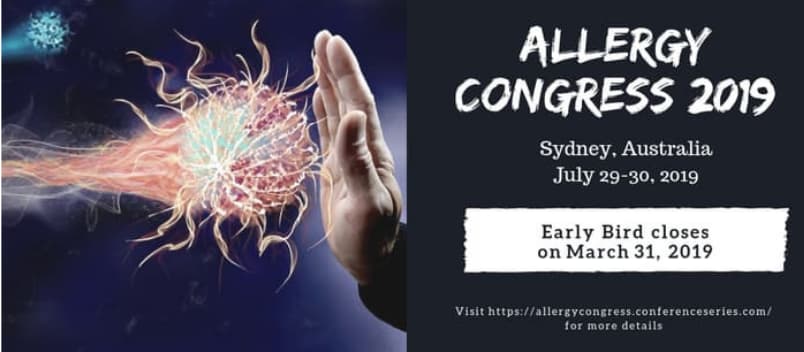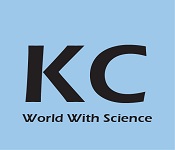About Conference
Conferences Series LTD invites all the participants from all over the world to attend World Congress on Allergy, Infectious Diseases and Immunology (Allergy Congress 2019) during July 29-30, 2019, in Sydney, Australia; which includes prompt keynote presentations, Oral talks, Poster presentations, Exhibitions, Workshops, Symposiums, Panel discussions and Pre-Conference events.
Allergy Congress congregates all the global leaders in immunology to share their research at this exclusive scientific event. Allergy Congress 2019 is aimed at recognizes advances in the field of allergy, immunology and its therapeutics.
Conferences Series LLC organizes a conference series of 3000+ Global Events inclusive of 100+ Conferences, 100+ Upcoming and Previous Symposiums and Workshops in the USA, Europe & Asia with support from 1000 more scientific societies and publishes 700+ Open access journals which contain over 50000 eminent personalities, reputed scientists as editorial board members.
Why attend Allergy Congress 2019
With members from around the world focused on learning about Allergy, Infectious Diseases, Immunology, and its innovations; this is your best opportunity to reach the largest assemblage of participants from the world Immunology community. Allergy Congress 2019 Includes presentations, distribute information, meet with current and potential scientists, make a splash with new advanced medication developments, and receive name recognition at this 2-day event. World-renowned speakers, the most recent techniques, developments, and the newest updates in Allergy, Immunobiology, Immunology and so on are hallmarks of this conference.
City Description:
Sydney is the state capital of New South Wales and the most populous city in Australia and Oceania located on Australia's east coast, the metropolis surrounds the world's largest natural harbor and sprawls about 70 km (43.5 mi) on its periphery towards the Blue Mountains to the west, Hawkesbury to the north and Macarthur to the south. Sydney is made up of 658 suburbs, 40 local government areas, and 15 contiguous regions. Sydney is a vibrant, cosmopolitan city with a diverse population featuring a rich history, internationally-recognized tourist attractions and an exciting calendar of events. The City of Sydney is the local government authority responsible for the city center and more than 30 suburbs within our boundaries. The major City attractions are the Sydney Opera House, Sydney Harbour Bridge, Bondi Beach, Taronga Zoo, and Darling Harbour.
Sessions/Tracks
Track 1: Allergy | Allergy Conferences | Immunology Conferences
An allergy occurs when a person's immune system reacts to substances in the environment that are harmless for most people. These substances are known as allergens and are found in dust mites, pets, pollen, insects, ticks, molds, foods and some medicines.
Abstract Category Includes/Sub Tracks:
· Skin Allergy
· Drug Allergy
· Food Allergy
· ENT Allergy
· Pediatric Allergy
· Ocular Allergy
· Aquatic Animal Allergy
· Seasonal allergies
· And Related topics….
Track 2: Asthma | Allergy Conferences | Immunology Conferences
Asthma is a chronic disease involving the airways in the lungs. These airways, or bronchial tubes, allow air to come in and out of the lungs. For many asthma sufferers, the timing of these symptoms is closely related to physical activity. And, some otherwise healthy people can develop asthma symptoms only when exercising. People with a family history of allergies or asthma are more prone to developing asthma. Many people with asthma also have allergies. This is called allergic asthma.
Abstract Category Includes/Sub Tracks:
· Allergic asthma
· Asthma without allergies
· Aspirin Exacerbated Respiratory Disease (AERD)
· Occupational asthma
· And Related topics….
Track 3: Human Infectious Diseases | Infectious Diseases Conferences | Allergy Conferences
All living things are subject to attack from disease-causing agents. Even bacteria, so small that more than a million could fit on the head of a pin, have systems to defend against infection by viruses. This kind of protection gets more sophisticated as organisms become more complex. Multicellular animals have dedicated cells or tissues to deal with the threat of infection. Some of these responses happen immediately so that an infecting agent can be quickly contained. Other responses are slower but are more tailored to the infecting agent. Collectively, these protections are known as the immune system.
Abstract Category Includes/Sub Tracks:
· Hepatitis-B
· Malaria
· Hepatitis-C
· Tuberculosis
· AIDS (Acquired immunodeficiency syndrome)
· HIV (Human immunodeficiency virus)
· And Related topics….
Track 4: Zoonotic Diseases | Virology Conferences | Allergy Conferences
Zoonotic means infectious diseases that are spread between animals and people, because these diseases can cause sickness or death in people. However, some animals can carry harmful germs that can be shared with people and cause illness – these are known as zoonotic diseases or zoonoses. Zoonotic diseases are caused by harmful germs like viruses, bacteria, parasites, and fungi. These germs can cause many different types of illnesses in people and animals ranging from mild to serious illness and even death. Some animals can appear healthy even when they are carrying germs that can make people sick.
Abstract Category Includes/Sub Tracks:
· Anthrax
· Australian bat lyssavirus
· Brucellosis
· Cat-scratch disease
· Cryptococcosis
· Giardiasis
· Hendra virus
· Hydatid disease
· Q fever
· And Related topics….
Track 5: Virology | Allergy Conferences | Pathology Conferences
Virology is the study of viruses and virus-like agents, including (but not limited to) their taxonomy, disease-producing properties, cultivation, and genetics. It is often considered a part of microbiology or pathology. In the early years, this discipline was dependent upon advances in the chemical and physical sciences, but viruses soon became tools for probing basic biochemical processes of cells. Viruses have traditionally been viewed in a rather negative context as agents responsible for the disease that must be controlled or eliminated. However, viruses also have certain beneficial properties that can be exploited for useful purposes (for example in gene therapy or vaccinology).
Abstract Category Includes/Sub Tracks:
· Bird Flu
· Chickenpox
· Common Cold
· Cytomegalovirus (CMV) Infection
· Dengue
· Ebola Virus and Marburg Virus Infections
· And Related topics….
Track 6: Immunology | Asthma Conferences | Allergy Conferences
Immunology deals with the physiological functioning of the immune system in states of both health and disease as well as malfunctions of the immune system in immunological disorders like allergies, hypersensitivities, immune deficiency, transplant rejection and autoimmune disorders. Immunology deals with physical, chemical and physiological characteristics of the components of the immune system in vitro, in situ, and in vivo. Immunology has a vast array of uses in several disciplines of science and medical science.
Abstract Category Includes/Sub Tracks:
· Human Immune System
· Basic Autoimmunity
· Tumor Immunology
· Transplantation Immunology
· Viral Immunology
· Veterinary and Comparative Immunology
· Technological Innovations in Immunology
· Vaccines and Immunotherapy
· Clinical Immunology
· And Related topics….
Track 6: COPD | Immunology Conference | Allergy Conferences
Chronic obstructive pulmonary disease or COPD is a set of chronic inflammatory lung disease. The disease is contributed by Emphysema and chronic bronchitis. Emphysema is the condition in which the alveoli get destroyed and chronic bronchitis is the condition where inflammation of the lining of the bronchial tubes takes place. The main cause for COPD is exposure to irritating gases or particulate matter, mostly cigarette smoke. People who smoke even after having asthma or people who have long-term exposure to chemical fumes, vapors, and dust in the workplace, fumes from burning fuel for cooking and heating in poorly ventilated homes are at risk of developing COPD. Rare cause for COPD is genetic disorder: alpha-1-antitrypsin deficiency. COPD symptoms don’t appear initially hence research in COPD diagnosis in enhancing as misdiagnosis can increase the risk of COPD in the person cause heart disease, lung cancer and so on.
Abstract Category Includes/Sub Tracks:
· Signs and Symptoms
· Diagnosis
· Prognosis and Epidemiology
· Alpha-1-antitrypsin deficiency
· COPD pathophysiology and research
· Emphysema and Chronic bronchitis
Track 8: Neonatal and Paediatric Immunology | Allergy Conferences | Asthma Conferences
Considering the case of neonates and children where the immune system is not fully functional at birth and still developing, later on, the chances of them being susceptible to infections and pathogens are high and response to vaccines is not that effective compared to adults. This could later lead to the development of allergy, asthma or other immune disorders hence the care and prevention methods employed are discussed under Neonatal Immunology and Pediatric Immunology. Infants receive their innate immunology through their mother either by placenta when they are in the womb or through breast milk. Immunity acquired later on by infants and kids is acquired through life. Asthma pregnancy i.e. if the mother has asthma then chances exists for children to develop allergy/ asthma. Children who get in contact with several foreign agents are prone to Pediatric Allergy.
Abstract Category Includes/Sub Tracks:
· Foetal & Neonatal Immunology
· Paediatric Allergy
· Outdoor & Indoor Allergens
· Paediatric Asthma and Rhinitis
· Vaccination effectiveness
Track 9: Immunotherapy | Allergy Conferences | Immunology Conferences
Immunotherapy is the treatment of disease by inducing, enhancing, or suppressing an immune response. In recent years, immunotherapy has become of great interest to researchers, clinicians and pharmaceutical companies, particularly in its promise to treat various forms of cancer. With thousands of patents filed annually on the subject, it is estimated that there are thousands of immunotherapy licensing opportunities across technology transfer offices that are in need of development and commercialization partners. Immunomodulatory regimens often have fewer side effects than existing drugs, including less potential for creating resistance when treating microbial disease.
Abstract Category Includes/Sub Tracks:
· Activation Immunotherapy
· Suppression Immunotherapy
· Helminthic Immunotherapy
· Others
Track 10: Market and Future of Therapeutics | Allergy Conferences | Immunology Conferences
Allergy diagnostics and the immunotherapeutic market is expected to increase by a huge amount suspects several market analysts due to increasing prevalence of allergic conditions. The increasing lifestyle habits, pollution and urbanization targets diseases like asthma and food allergy at a hype increasing the incidences of allergies and demanding cost-effective, sensitive and accurate diagnostic products and therapeutics among hospitals, diagnostic labs and healthcare companies worldwide. The rising level of environmental pollution and the need for faster, accurate and high throughput technologies has increased the allergy diagnostics market product wise with assay kits, immunoassay analyzers, luminometers and ELISA analyzers dominating the market which is followed by inhaled allergens. North America followed by Europe, Asia and the Middle East are countries accounting for allergy research and market share.
Abstract Category Includes/Sub Tracks:
· Antihistamines
· Vaccines
· Allergen products
· Immunotherapy products
· SLIT drops and tablets
· Pollinex Quattro
· Market sales by country & products
Major Immunology Associations Globally
Related Conferences:
9th Immunology Conferences associated with Antibody Engineering Meeting, June 14-16 2018 Rome, Italy
5th Parasitology Conferences & Microbiology Conferences, July 12-13, 2018 Paris, France
10th Cellular Immunology Conferences, August 6-7, 2018 Madrid, Spain
11th Immunology Congress & Immunotechnology Meetings, September 13-14, 2018 Zurich, Switzerland
World Vaccine Conferences and Immunology Congress, September 13-14, 2018 Bucharest, Romania
3rd Tumour Conferences & Cancer Immunology Conferences and Immunotherapy Congress, September 17-18, 2018 San Diego, California, USA
Immunology Congress and Molecular Biology Conferences, September 20-21, 2018 Oslo, Norway
12th Allergy Congress, Asthma Congress & Clinical Immunology Conferences, October 1-2, 2018 Moscow, Russia
10th Immunology Congress, October 19-20, 2018 New York, USA
10th Immunity Congress, Inflammation Conferences, and Immunotherapies Conferences, October 19-20, 2018 New York, USA
6th HIV/AIDS Conferences, STD Conferences and STI Conferences, October 29-30, 2018 San Francisco, USA
World Tuberculosis Congress and Lung Diseases Conferences, November 12-13, 2018 Tokyo, Japan
3rd Autoimmunity Congress, November 26-27, 2018 Dublin, Ireland
Annual Antibiotics Congress, December 06-07, 2018 Amsterdam, Netherlands
Market Research Report
Allergy, Infectious Diseases, and Immunology Market Research Report
Introduction:
An allergy occurs when a person's immune system reacts to substances in the environment that are harmless for most people. The allergy refers to the damaged or hypersensitive immune responses towards substances that either enter or come in contact with the human body, such as food, pollen, dust or fur, and pet dander. Although allergies can develop at any age, the risk of developing allergies is genetic in nature. Some of the most common allergic conditions include hay fever, allergic eyes, asthma, and allergic shock.
An allergy is a hypersensitivity disorder of the immune system. It is an immunologically mediated reaction to a foreign antigen, resulting in abnormally intense immune responses, which cause tissue inflammation and organ dysfunction. Common allergic reactions include eczema, hives, hay fever, asthma attacks, food allergies, and reactions to the venom of stinging insects. Allergy sufferers are estimated to number around 60 to 70 million in the United States, with hay fever being the most common.
Allergies can be classified as seasonal, perennial and food allergies. Seasonal allergies are mainly confined to the outdoors and are caused by blooming trees (spring), grass (summer), and weeds (fall), whereas perennial allergies occur throughout the year and are triggered by indoor activities arising from dust and mould. Common food allergies include reactions to peanuts, shellfish, fish, milk, eggs, wheat and soybeans.

Global Allergy Diagnostic Market: Segmental Snapshot:
The market report has been segmented on the basis of product type, allergen type, end user, and region. The product type segments include assay kit, instruments, and services. Allergen type segments include inhaled allergen, food allergen, drug allergen, and others. End-use type segment includes hospitals, laboratories, academics, and others. The regions and countries covered in the analysis are North America, Europe, Asia Pacific, Latin America, and Rest of the World.
By product type: Assay kits segment is estimated to register a CAGR of over 13.0%, thereby accounting for highest revenue share among the type segments.
By allergen type: Inhaled allergen segment is estimated to account for highest revenue share among the allergen type segments, registering a CAGR of over 12.9% over the forecast period.
By end-user: laboratories segment is estimated to account for the highest revenue share among the allergen type segments, registering a CAGR of over 12.9% over the forecast period.
By region: The market in North America accounted for highest revenue share in the global allergy diagnostic market in 2016, and is expected to record highest CAGR of over 12.3% between 2016 and 2026.

Allergy Treatment Market: Region-wise Outlook:
Depending on geographic regions, global allergy treatment market is segmented into seven key regions: North America, South America, Eastern Europe, Western Europe, Asia Pacific, Japan and Middle East & Africa. North America followed by Europe dominates the global allergy treatment market due to increasing number of patients with a various type of allergies including respiratory allergy, skin allergy, eye allergy, etc. growing environmental pollution, developed healthcare infrastructure and growing demand for immunotherapy for the treatment of allergies in this region. Asia-Pacific is the fastest emerging market for global allergy treatment due to growing allergic patient population, increasing awareness about advanced immunotherapy for the treatment of allergies available in the market, developing healthcare infrastructure and rising government spending in the healthcare industry in this region.
CAGR% report from 2016-2020:

References: https://www.prnewswire.com/news-releases/global-allergy-diagnostic-market-revenue-cagr-to-exceed-124---marketresearchbiz-660752573.html
https://www.marketresearch.com/Life-Sciences-c1594/Pharmaceuticals-c89/Allergy-Immunology-c1576/
https://www.futuremarketinsights.com/reports/allergy-treatment-market
Why attend Allergy Congress 2019?????
With members from around the world focused on learning about Allergy, Infectious Diseases, Immunology and its innovations; this is your best opportunity to reach the largest assemblage of participants from the world Immunology community. Allergy Congress 2019 Includes presentations, distribute information, meet with current and potential scientists, make a splash with new Aquaculture developments, and receive name recognition at this 2-day event. World-renowned speakers, the most recent techniques, developments, and the newest updates in Allergy, infectious diseases, Immunology and so on are hallmarks of this conference.
Past Conference Report
Allergy Congress 2018
Allergy Congress 2018
Allergy Congress 2018: Past Conference Report
We would like to thank all of our wonderful keynotes, speakers, conference attendees, students, associations, media partners, exhibitors and guests for making Allergy Congress 2018 a successful event.
With the overwhelming success of the previous conferences, Conference series hosted the “World Congress on Allergy and Immunotherapy” during May 16-17, 2018 at Osaka, Japan with the theme “Recent Advancements in Hypersensitivity and Immunotherapy.” was a great success, where eminent keynote speakers from various reputed institutions and organizations with their resplendent presence addressed the gathering.
Benevolent response and active participation were received from the renowned experts and Editorial Board Members of Conference series Journals as well as from the allergists, researchers, students and leaders in Immunology, who made this event successful.
The Conference was carried out through various informative and cutting-edge sessions, in which the discussions were held on the following thought-provoking and celebrating scientific tracks:
-
Asthma
-
Skin Allergy
-
Drug Allergy
-
ENT Allergy
-
Food Allergy
-
Clinical Immunology & Allergy
-
Pediatric Allergy
-
Ocular Allergy
-
Infection and Allergy
-
Gastrointestinal immunology and allergy
-
Allergy Diagnosis & Medicine
-
Allergy Prevention, Risk Factors & Treatment
-
Biomarkers for Allergy, Asthma & Clinical Immunology
-
Immunotherapy
The conference was moderated by Pranab Kumar from Conferences Series, UK
The conference was embarked with an opening ceremony followed by lectures delivered by members of the Keynote forum.
Conference series acknowledge the support of Chairs for whom we were able to run smoothly the scientific sessions includes
Conference Sessions Chairs:
-
Dennis Song, USA
-
En-Chih Liao, Mackay Medical College, Taiwan
Conference Series Ltd offers its heartfelt appreciation to Societies and Organizations includes Allied Academies and is also obliged to the Organizing Committee Members, adepts of field, various outside experts, company representatives and other eminent personalities who interlaced with Conference series in supporting and making the conference never before one.
Your rejoinder is our inspiration; keeping this motto in mind and being witnessed the triumph of Allergy Congress 2018, Conference Series Ltd is delighted to announce the next event. Mark your calendars for the upcoming extravaganza, "2ndWorld Congress on Allergy, Infectious Diseases and Immunology" to be held during July 29-30, 2019 at Sydney, Australia
For details Visit: https://allergycongress.conferenceseries.com/
Past Reports Gallery












